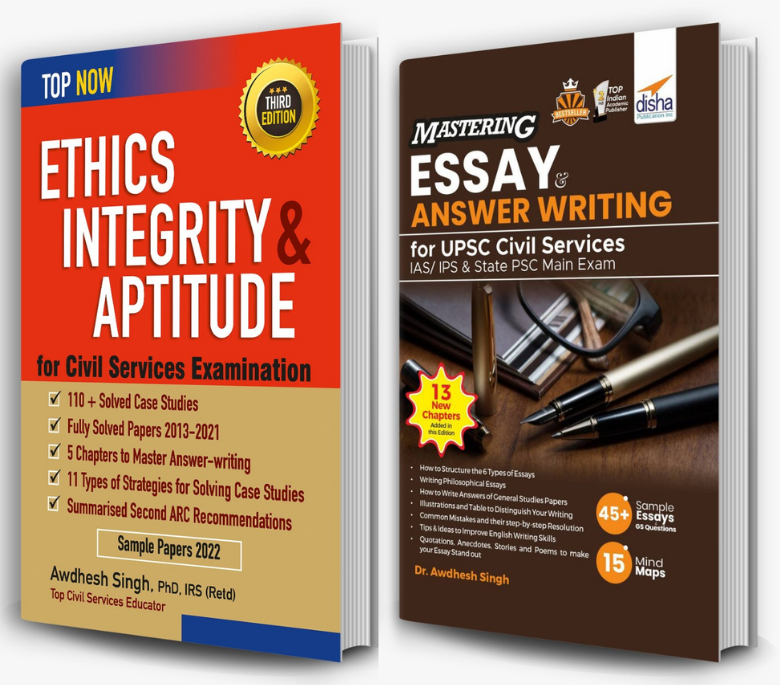Topics
All
Civil Services in India (26)
Ethics, Integrity and Aptitude
» Chapters from Book (11)
» Case Studies (8)
Solved Ethics Papers
» CSE - 2013 (18)
» CSE - 2014 (19)
» CSE - 2015 (17)
» CSE - 2016 (18)
» CSE - 2017 (19)
» CSE - 2018 (19)
» CSE - 2019 (19)
» CSE - 2020 (19)
» CSE - 2021 (19)
» CSE -2022 (17)
» CSE-2023 (17)
Essay and Answer Writing
» Quotes (34)
» Moral Stories (18)
» Anecdotes (11)
» Beautiful Poems (10)
» Chapters from Book (5)
» UPSC Essays (40)
» Model Essays (38)
» Research and Studies (4)
Economics (NCERT) Notes
» Class IX (14)
» Class X (16)
» Class XI (55)
» Class XII (53)
Economics Current (51)
International Affairs (20)
Polity and Governance (61)
Misc (77)
Select Topic »

Civil Services in India (26)
Ethics, Integrity and Aptitude (-)
» Chapters from Book (11)
» Case Studies (8)
Solved Ethics Papers (-)
» CSE - 2013 (18)
» CSE - 2014 (19)
» CSE - 2015 (17)
» CSE - 2016 (18)
» CSE - 2017 (19)
» CSE - 2018 (19)
» CSE - 2019 (19)
» CSE - 2020 (19)
» CSE - 2021 (19)
» CSE -2022 (17)
» CSE-2023 (17)
Essay and Answer Writing (-)
» Quotes (34)
» Moral Stories (18)
» Anecdotes (11)
» Beautiful Poems (10)
» Chapters from Book (5)
» UPSC Essays (40)
» Model Essays (38)
» Research and Studies (4)
Economics (NCERT) Notes (-)
» Class IX (14)
» Class X (16)
» Class XI (55)
» Class XII (53)
Economics Current (51)
International Affairs (20)
Polity and Governance (61)
Misc (77)

National Education Policy, 2020
Approved on 29 July, 2020, the National Education Policy 2020 (NEP) outlines the vision of India's new education system. It replaces the previous National Policy on Education, 1986. The policy is a comprehensive framework for elementary education to higher education as well as vocational training in both rural and urban India. The policy aims to transform India’s education system by 2040. The draft NEP was submitted in 2019 by a panel led by former Indian Space Research Organisation (ISRO) chief Krishnaswamy Kasturirangan. It was later released by the Ministry of Human Resource Development, followed by a number of public consultations.
Provisions of NEP:
·The NEP proposes sweeping changes including opening up of Indian higher education to foreign universities:
·dismantling of the UGC and the All India Council for Technical Education (AICTE)
·introduction of a four-year multidisciplinary undergraduate programme with multiple exit options
·and discontinuation of the M.Phil programme.
·In a significant shift from the 1986 policy, which pushed for a 10+2 structure of school education, the new NEP pitches for a 5+3+3+4 design:
·3-8 years (foundational stage), 8-11 (preparatory), 11-14 (middle), and 14-18 (secondary).
·This brings early childhood education or pre-school education for children of ages 3 to 5 under the ambit of formal schooling.
·The mid-day meal programme will be extended to pre-school children.
·The NEP says students until Class 5 should be taught in their mother tongue or regional language.
·The policy also proposes phasing out of all institutions offering single streams
·All universities and colleges must aim to become multidisciplinary by 2040.
·A Higher Education Council of India (HECI) will be set up to regulate higher education. The council's goal will be to increase gross enrolment ratio. The HECI will have 4 verticals:
·National Higher Education Regulatory Council (NHERC), to regulate higher education, including teacher education, while excluding medical and legal education.
·National Accreditation Council (NAC)
·Higher Education Grants Council (HEGC), for funding and financing of universities and colleges.
·General Education Council (GEC)
·The fees of both private and public universities will be fixed.
Implementation:
The NEP only provides a broad direction and is not mandatory to follow. Since education is a concurrent subject, the reforms proposed can only be implemented collaboratively by the Centre and the states. The government has set a target of 2040 to implement the entire policy.
The government will set up subject-wise committees with members from relevant ministries at both the central and state levels to develop implementation plans for each aspect of the NEP. The plans will list out actions to be taken by multiple bodies, including the HRD Ministry, state Education Departments, school Boards, NCERT, Central Advisory Board of Education and National Testing Agency, among others.

Looking for a One-stop Solution to prepare for ‘Ethics, Integrity, and Aptitude’ and ‘Essay and Answer Writing’ for UPSC?
Buy Dr. Awdhesh Singh’s books from the links below-
Ethics, Integrity & Aptitude for Civil Services Examination
Amazon - https://amzn.to/3s1Qz7v
Flipkart - https://bit.ly/358N2uY
Mastering Essay & Answer Writing for UPSC Civil Services
Amazon - https://amzn.to/3JELE2h
Flipkart - https://bit.ly/3gVIwmv
| Related Articles |
| Recent Articles |
